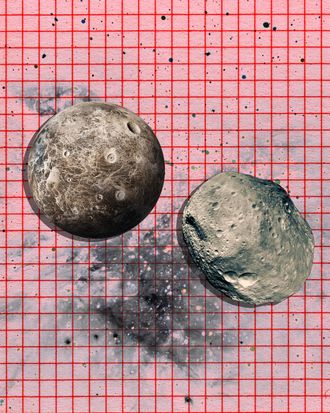
Despite what Hollywood would have you believe — Armageddon! Deep Impact! — asteroids are not harbingers of apocalyptic destruction. In astrology, they’re celestial bodies that add nuance, dimension, and unique perspective to your individual birth chart. See, it’s not scary!
There are millions of asteroids drifting around our solar system, but the majority are confined to a region of space referred to as the “asteroid belt,” located between Mars and Jupiter. Interestingly, Jupiter (the planet of fortune) is actually responsible for our own planet’s luck: Thanks to Jupiter’s enormous size and equally massive gravitational pull, its energetic tug actually prevents those thousands of asteroids from careening toward Earth. (As I always say, There Are No Coincidences. Ahem, also not a coincidence that I always say that!)
But of the many, many asteroids floating through space, the first four discovered by astronomers in the early 1800s — Ceres, Pallas, Juno, and Vesta — have rich astrological interpretations. (Plus, their namesakes are rooted in the mythology of female deities — a much-needed alternative to the planetary lineup composed of predominantly male archetypes. The narratives that embolden these asteroids tell tales of disrespected, misunderstood, and complex creatures, and, likewise, reflect powerful nuances within our own charts.)
So what do the asteroids mean? And what do they do? Below, our guide to the asteroids.
Ceres
Ceres is named after the Roman goddess of agriculture, grain, harvest, fertility, and motherly relationships. In Roman mythology, Ceres’s daughter, Proserpina (Persephone in Greek mythology), was abducted by Pluto. Ceres was forced to make a deal with Pluto in order to get Proserpina back — but for only six months of the year. Proserpina would remain with Ceres for the spring and summer months, then descend into the underworld to reign with Pluto during the fall and winter months. As such, Ceres is connected to the life, death, and rebirth cycles of nature, along with grief and separation. Ceres provides greater insight into the practical and physical ways you nourish, along with your devotion to caretaking, your relationship to the cyclical nature of life, and how you metabolize loss and life transitions.
Everyone has all asteroids in their birth chart. To find Ceres in your chart, use a birth chart calculator like TimePassages or Astro.com. The zodiac sign Ceres occupies will show how you nourish yourself, and its House placement will reveal where that energy shows up in your life. Use this to get a deeper understanding of what self-care, emotional protection, and spiritual— as well as physical — nourishment means for you individually. For instance, if you have Ceres in Cancer in the Sixth House of health, this may suggest that tending to your daily schedule is an integral part of your wellness routine.
Pallas
Named after the Greek goddess of War, Pallas Athene (also known as Pallas) is associated with strategy, intelligence, and skill. (And associated with Minerva in Roman mythology, or as the name Athena in Greek mythology.) Born from Zeus’s head in a full suit of armor, Pallas wielded much power as a shrewd warrior, creative intellectual, and skilled craftsperson. Accordingly, Pallas represents creative intelligence, problem-solving, strategic thinking, determination, grit, talent, tenacity, and the fight for justice. In your birth chart, Pallas sheds light on the strategies you use to fight for the things you believe in, your style of problem-solving, your unique flavor of creative and critical-thinking skills, and the ways in which you assert yourself. Just as Pallas often worked with her brother, your Pallas placement can also provide a nuanced perspective on your relationship to the men in your life and how you tap into your innate masculine energy. It can reveal how you feel most “seen” in a patriarchal world, as well as how you embrace or reject authority.
In your birth chart, the zodiac sign Pallas occupies will reveal how you strategize, and Pallas’s House placement will expose where that narrative manifests. For instance, if you have Pallas in Aries in the Third House of communication, this may indicate that spontaneous brainstorms with friends, colleagues, and classmates enables you to unlock clever, strategic ideas.
Juno
Juno’s name comes from the Roman goddess of marriage, childbirth, motherhood, family, and home. Juno (associated with Hera in Greek mythology) has a complex history in classical antiquity and embodies many different feminine archetypes. She was worshipped by the Romans in annual festivals, including the celebration of the New Year (then March 1) as the “mother” of spring, and was also recognized as the loyal — albeit deeply wronged — wife of Jupiter (Zeus). Jupiter was a notoriously unfaithful husband, and much of Juno’s story revolves around the dynamics of their fraught relationship. Despite Jupiter’s affairs, Juno remained faithful and devoted and, accordingly, Juno’s layered archetype speaks to commitment, loyalty, sacrifice, and betrayal. The Roman goddess Juno was a nuanced and multifaceted individual, maintaining roles as a devoted wife, dedicated mother, protector of the Roman state, and political figure.
When you identify Juno in your chart, the sign it sits within will reveal how Juno expresses itself, and the House will expose where that energy shows up in your life. For instance, if you have Juno in Pisces in the Second House of values, this would indicate that being appreciated for your creativity and intuitive abilities is deeply important to you, and being fairly and appropriately compensated for your gifts is a huge sign of respect.
Vesta
The brightest asteroid visible from Earth thanks to its highly reflective surface, Vesta is named after the Roman goddess of the hearth, home, and family. Vesta — or Hestia in Greek mythology — is considered a spiritual guardian. In fact, Vesta symbolized the Vestal Virgins, who were responsible for maintaining the flames of the city. Because resources of light and fire in the Roman Empire were so scarce, Vesta was worshiped and adored in her ability to maintain the eternal flame at the Temple of Vesta. Likewise, Vesta is associated with spirituality, innate personal power, wholeness, responsibility, devotion, passion, sanctuaries, and isolation. Vesta symbolizes what you wish to devote yourself to, what you hold sacred, and what warms your soul. It’s the piece of you that is pure, whole, and eternally true. It illuminates how you fuel your passions and feed your spirituality.
Again, the zodiac sign and House Vesta occupies within your natal chart will reveal how and where the asteroid shows up in your life. So if you have Vesta in Sagittarius in your Twelfth House of the subconscious, for instance, this may indicate that you are on a perpetual quest for knowledge as it relates to your personal spirituality, and your relentless passion about unlocking life’s many mysteries is something you hold incredibly sacred.
More Astrology 101
- Get Ready for the Solar Eclipse in Aries to Change You
- A Guide to the Water Signs: Cancer, Scorpio, and Pisces
- A Guide to the Earth Signs: Taurus, Virgo, and Capricorn





